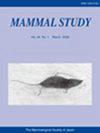Predicting the Effect of Countermeasures for Crop-Raiding Japanese Macaques Using the Conditions of Human Settlements
IF 0.8
4区 生物学
Q3 ZOOLOGY
引用次数: 0
Abstract
Abstract. For macaque management, it is recommended that residents use countermeasures, such as psychological attacks using fireworks and other to drive macaques away from farmland. However, these require settlement-wide cooperation and continuous implementation. I surveyed residents within settlements and aimed to clarify the conditions under which countermeasures were successful. I hypothesized that the effectiveness of countermeasures can be explained by the situation within the macaque-damaged settlements. A questionnaire survey such as the situation of the settlement, crop damage, and the state of macaque management was conducted in 2017 in each settlement of six municipalities in Niigata Prefecture. A gradient boosting model was used to predict the effects of psychological attacks and electric fences on multiple conditions. Of the 219 survey results, 193 settlements were affected by Japanese macaques. Several variables including the number of cooperative entities within the municipality, the number of settlement maintenance activities, and the degree of damage contributed to the effect of psychological attacks. Only the number of cooperative entities within the municipality contributed to the effect of the electric fence. The feasibility of implementing each of these countermeasures for macaque control could be predicted by assessing the situation in each settlement.利用人类住区条件预测日本猕猴袭击农作物对策效果
摘要对于猕猴的管理,建议居民采取对策,例如使用烟花等进行心理攻击,将猕猴赶出农田。然而,这些需要整个定居点的合作和持续执行。我调查了定居点内的居民,旨在澄清对策成功的条件。我假设对策的有效性可以通过猕猴受损定居点内的情况来解释。2017年,在新泻县六个市镇的每个定居点进行了一项问卷调查,如定居点的情况、作物损失和猕猴管理状况。使用梯度增强模型来预测心理攻击和电围栏对多种条件的影响。在219个调查结果中,193个定居点受到日本猕猴的影响。一些变量,包括市镇内合作实体的数量、定居点维护活动的数量和破坏程度,都是造成心理攻击影响的原因。只有市镇内的合作实体数量对电围栏的影响有贡献。通过评估每个定居点的情况,可以预测实施每一项猕猴控制对策的可行性。
本文章由计算机程序翻译,如有差异,请以英文原文为准。
求助全文
约1分钟内获得全文
求助全文
来源期刊

Mammal Study
ZOOLOGY-
CiteScore
1.70
自引率
20.00%
发文量
23
审稿时长
>12 weeks
期刊介绍:
Mammal Study is the official journal of the Mammal Society of Japan. It publishes original articles, short communications, and reviews on all aspects of mammalogy quarterly, written in English.
 求助内容:
求助内容: 应助结果提醒方式:
应助结果提醒方式:


